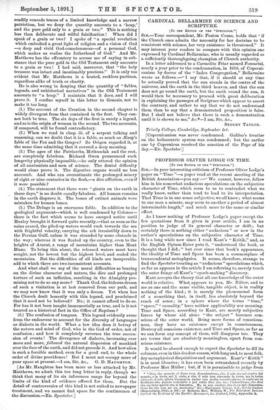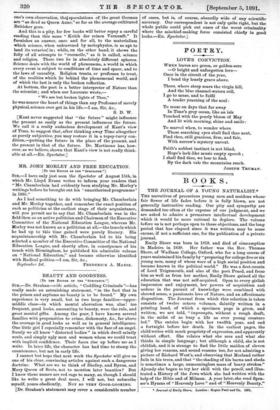PROFESSOR OLIVER LODGE ON TIME.
[To THE EDITOR OP THE " SPECTATOR:]
Sin,—In your interesting criticism of Professor Oliver Lodge's paper on " Time "—a paper read at the recent meeting of the British Association—you say :—" We cannot, however, follow him in his somewhat audacious speculations on the subjective character of Time, which seem to us to contradict what we really know, rather than tend to lead to its interpretation. That Time is in one sense subjective, we all know ; what seems to one man a minute, may seem to another a period of almost interminable length," and much more to the same or similar effect.
As I know nothing of Professor Lodge's paper except the few quotations from it given in your article, I am in no position to judge of its general character or drift ; but certainly there is nothing either " audacious " or new in the author's speculations on the subjective character of Time, It is a long while now since I read Kant's " Kritik," and, as the English opium-Eater puts it, "understood the book, or thought that I did ; " but ever since that book's appearance, the ideality of Time and Space has been a commonplace of transcendental metaphysics. It seems, therefore, strange to find the Spectator treating as "audacious " speculations which, so far as appears in the article I am referring to, merely touch the outer fringe of Kant's " epoch-making " discovery.
Kant accepts the theory that all our knowledge of the outer world is relative. What appears to you, Mr. Editor, and to me as one and the same visible, tangible object, is in reality nothing of the kind ; it is merely the phenomenal form of a something that, in itself, lies absolutely beyond the reach of sense ; in a sphere where the terms "time," " space," " causality," have neither applicability nor meaning. Time and Space, according to Kant, are merely subjective forces by whose aid alone " the subject " becomes con- scious of the outer world. Being mere forms of conscious- ness, they have no existence except in consciousness. Destroy all conscious existence, and Time and Space, so far as we can form any concept of them, will disappear too. They are terms that are absolutely meaningless, apart from con- scious existence.
It would be absurd enough to expect the Spectator to fill its columns, even in this deadest season, with long and, to most folk, dry metaphysical disquiSition and argument. Kant's " Kritik " is in most libraries; it has even been retranslated recently by Professor Max Miiller; but, if it is permissible to judge from • "Dice she quando ci fosse vera dimostratione, che it sole sta nel centre del mondo, e la terra nel 3. ciao, e ohs it sole non ciroonda la terra, ma Is terra cireondu it sole, allora bisogneria andar con molts consideration., in °apneas° le Scrittnre che Filen° contrarie e pia sotto dire ohs nou Pintendiamo, che dire the aia false audio elm si dimostra. Ma io non crederO che of a a tale dimostra- 'hone fin che non mi sia mostrata, &c.—Hartmann Omar. 8.J, Ga1ihistudien
against the octrine of the Earth's Movement, &c, (Oxford, 1885), Appendix A.,
one's own observation, they speculations of:tbe great German are " as dead as Queen Anne," so far as the average cultivated Britisher goes.
And this is a pity, for few books will better repay a careful reading than this same " Kritik der reinen Vernunft." It furnishes an answer, once and for all, to the materialism which science, when unleavened by metaphysics, is so apt to land its votaries, in; while, on the other hand, it shows the folly of all attempts to "reconcile," as it is called, science and religion. These two lie in absolutely different spheres. Science deals with the world of phenomena, a world in which every event is subject to conditions of time and space, and to the laws of causality. Religion treats, or professes to treat, of the realities which lie behind the phenomenal world, and of which the last is only the broken reflection.
At bottom, the poet is a better interpreter of Nature than the scientist; and when our Laureate wrote,—
"We are but broken lights of Thee," he was nearer the heart of things than any Professor of merely physical. science ever got in his life.—I am, Sir, &c., S. D. W.
[Kant never suggested that "the future" might influence
the present as easily as the present influences the future. We call it a really audacious development of Kant's view of Time, to suggest that, after thinking away Time altogether as purely subjective, you may restore it in a topsy-turvy con- dition,—putting the future in the place of the present, and the present in that of the futnre. Dr. Martineau has, how- ever, as we believe, shown that Kant's view is not really think- able at all.—ED. Spectator.]



































 Previous page
Previous page